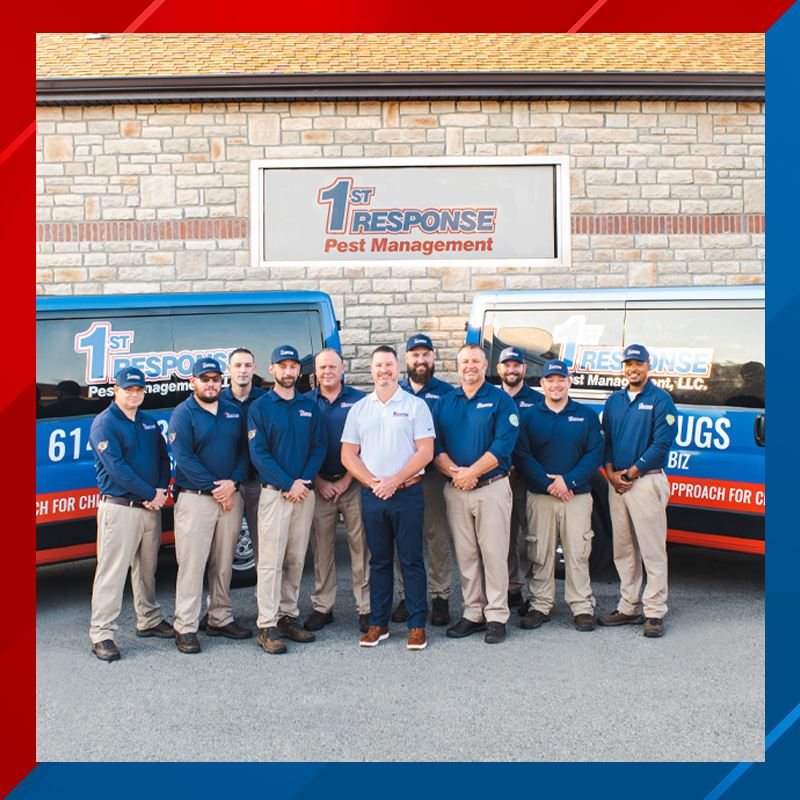
Stinging Insect Control Services in Columbus
Effective Solutions for Bees, Wasps & Hornets
If you're looking for a reliable pest control company serving the Columbus metro area, to get rid of stinging insects like hornets, bees, and wasps, look no further! 1st Response Pest Management has years of experience dealing with all kinds of pests, and we specialize in removing stinging insects from homes and businesses.
At our local pest control company, we use proven methods to remove stinging insects from your property. We begin by identifying the type of pest and assessing the extent of the infestation. Once we have a clear understanding of the problem, we'll come up with a customized plan to remove the insects and prevent future problems, e.g. identifying and removing potential nesting sites to prevent new infestations from occurring.
In addition to eradication, we offer ongoing maintenance options to help keep your property free of pests. Ask our team which package would best address your needs!
Contact us today to schedule a service appointment anywhere in the greater Columbus area.

Stinging Insect FAQs

What are stinging insects?
Stinging insects use their stingers to defend themselves from danger and are pests that you should always avoid. When living outside in environments that are not near people, stinging insects are important to the ecosystem, pollinating plants, flowers, and crops. Those species that are predatory help to keep populations of nuisance insects under control. However, when stinging insects nest near people, they become unwanted pests. Yellow jackets, bald-faced hornets, inground digger wasps, mud daubers, and carpenter bees are stinging insects that live in our area of Ohio.
Are stinging insects dangerous?
Stinging insects possess venom strong enough to trigger health problems in people. In the case of an attack by multiple stinging insects or in people that are severely allergic to their venom, anaphylaxis may occur. In addition to their venom, their stings are painful and may leave behind long-lasting welts.
Why do I have a stinging insect problem?
Stinging insects are outdoor pests, meaning they may place their nests in any yard or other outdoor space. These insects forage for food in gardens, yards, wooded areas, and around ponds and lakes. They also look for food in our outdoor eating areas, trash cans, and compost bins.
Where will I find stinging insects?
Where stinging insects prefer to build their nests depends on their species. They are either aerial or ground nesters.
- Yellow Jackets: Yellow jackets place their nests in the ground — under woodpiles, fallen trees, in tree stumps, and the ground nests of other small animals.
- Bald-Faced Hornets: Bald-faced hornets build paper nests and place them up off the ground. Common nesting sites include trees, utility poles, under roof eaves, chimneys, and decks.
- Inground Digger Wasps: Inground digger wasps place their nests in the ground, preferably in dry dirt in areas of direct sunlight.
- Mud Daubers: Mud daubers construct their nests out of mud and connect many short mud tubes. They like to place their nests in sheltered areas. Popular nesting sites include areas under eaves, in barns, attics, and other outbuildings.
- Carpenter Bees: Carpenter bees are solitary nesters. The females build their nests in unpainted, weathered pieces of wood — preferring softwood. Common carpenter bee nesting sites include fences, decks, wooden play structures, outdoor furniture, wood shingles, and roof eaves.
How can I prevent stinging insect infestations?
Prevent problems with stinging insects by putting into place the following stinging insect prevention measures:
- Partner with the pest control experts here at 1st Response Pest Management.
- Don’t overplant flowering vegetation on your property, especially near your home.
- Remove fallen trees, tree stumps, old woodpiles, and other debris from your yard.
- Fill any ground holes you find on your property.
- Caulk any openings you find in your home’s exterior walls.
- Replace torn or loose window or door screens to keep stinging insects out of your home.
- Keep tight-fitting lids on trash cans and compost bins and keep outdoor eating areas clean and free of food debris.
Call Now to Schedule Your Bee or Wasp Removal Service
Stinging insects can be more than just a nuisance – they can be dangerous. Hornets, bees, and wasps can sting multiple times and their venom can cause serious health issues in some individuals. For those allergic to insect stings, a swarm of these pests can be deadly. That's why it's important to get rid of them as quickly and safely as possible.
Call 1st Response Pest Management now at (614) 591-7767 to request a service quote for your next bee or wasp control service in Columbus.


-
About Us
-
Pest Library
-
Areas We Serve